What will an Eric Adams administration mean for New York? A look through his political past can offer one answer. City Limits has been covering City Hall’s next leader for nearly two decades. Here are some highlights.
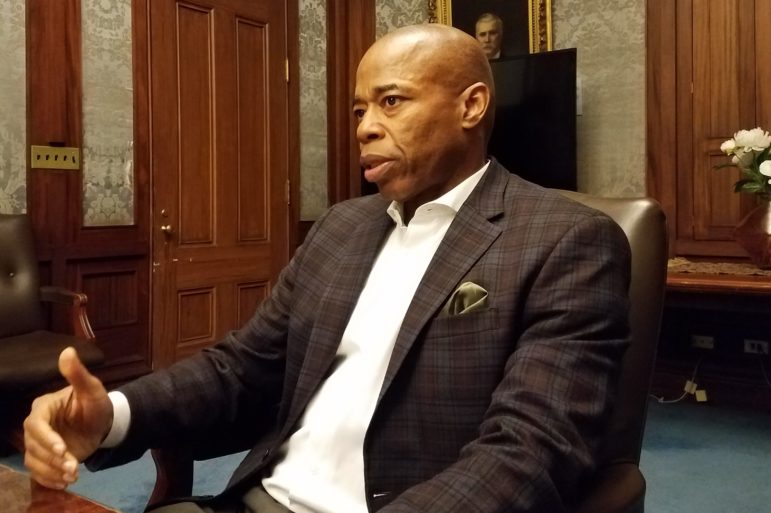
Jarrett Murphy
Brooklyn BP Eric Adams, seen here in 2018.
Flashback Friday is a weekly series highlighting a story from the vast archives of City Limits’ reporting as we celebrate our 45th anniversary this year.
If you value City Limits’ work, help us continue to cover New York City for decades more to come by donating here, or by purchasing a ticket to our anniversary celebration Nov. 18.
This week, more than a million New Yorkers headed to poll sites to choose the city’s next mayor, and more than 66 percent of them chose Brooklyn Borough President, former State Senator and former NYPD officer Eric Adams.
As we head into Adams’ expected January inauguration, the big question is: What will an Eric Adams administration mean for New York? What kind of mayor will Eric Adams be?
A look through his political past can offer one answer. City Limits has been covering City Hall’s next leader for nearly two decades, from his start in the public eye as a police reformer to his victory party on Tuesday. Here are some highlights of that coverage over the years.
2002 – Crossing The Line: Policing in Fort Greene’s Ingersoll Houses
Gentrification in Brooklyn’s Fort Greene at the time was giving way to “increasingly pricey historic brownstones and a blossoming of new cafes and bars,” fueled in part by a major drop in local crime, City Limits reported in its January 2002 issue. “Crime may be down, but arrests and confrontations with police have become a part of daily life,” the story reads—the start of Michael Bloomberg’s mayoralty and a controversial era of stop-and-frisk policing.
Adams, then an NYPD lieutenant at Fort Greene’s 88th Precinct and a founder of One Hundred Blacks In Law Enforcement, launched under the Giuliani administration to push for police reforms, offered his thoughts on the new mayor, post-Sept. 11 New York and the future of NYPD community relations:
During his campaign, Mayor Michael Bloomberg claimed that racial profiling didn’t even exist. Not surprisingly, his recently stated commitment to end such practices hasn’t convinced reformers that he’s serious. “Problems like racial profiling do not disappear just because a great tragedy has hit the city,” says Adams. “The officer who profiles pre-9/11 didn’t suddenly turn over a new leaf.”
Read the full story here
2008 – Activists Shift Strategy in Shelter Controversy
A few years later, Adams—now a Brooklyn state senator—joined the fight against a city plan to relocate the city’s main intake center for homeless men in Manhattan to the Bedford-Atlantic Armory in Crown Heights. Adams and others opposing the move, which included then-City Councilwoman Letitia James, argued the neighborhood was already dealing with an “over-saturation” of shelters and other social services.
2009 – More Than Words? Bloomberg and Race
This year, as Mayor Bloomberg was mounting his campaign for a controversial third term, City Limits editor Jarrett Murphy explored the incumbent’s track record on race in this October story. “The mayor has tried to reduce racial disparities in schools and health. But his policies on crime and development have exacerbated inequalities,” it reads. Sen. Adams also weighed in with some strong words criticizing Bloomberg and the mayor’s ubiquitous use of stop-and-frisk.
“Mayor Giuliani had a major problem with stop-and-frisk,” recalls state Sen. Eric Adams, a Brooklyn Democrat and retired police captain. “Bloomberg’s police department has four times the number of those same type of stops. They’ve been stopping everybody.”
Read the full story here
…
While allowing that Bloomberg handles the public discussion of race better than Giuliani, the mayor’s critics say that’s a low threshold. “Mayor Bloomberg benefits from one of the worst periods of our history. I’m not talking about 9/11. I’m talking about Rudy Giuliani as mayor,” says Adams. “Whoever came after him was such a sigh of relief, you really didn’t truly examine the person on their own merits.”
2013 – Former Gadfly Cop Nears Coronation as Brooklyn Borough President
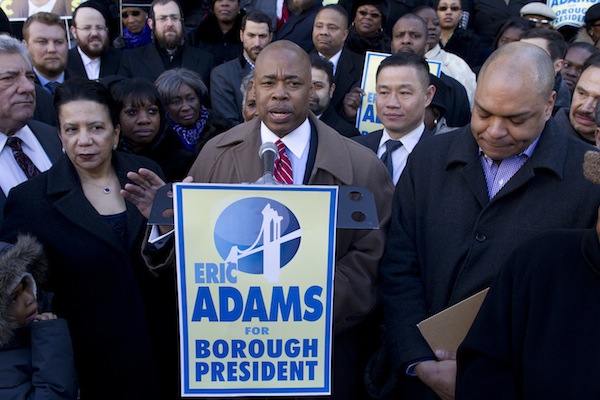
Pearl Gabel
Adams campaigning for Brooklyn borough president in 2013.In 2013, writer Norm Oder looked at Adams’ campaign and all-but-assured victory for Brooklyn borough president. The piece revisits some of Adams’ highlights during his tenure as state senator, including his criticism of stop-and-frisk and a odd billboard campaign encouraging city youth to pull their pants up (“Have pride in your appearance: if you raise your pants, you’ll also raise your image,” the “Stop the Sag!” campaign quotes him as saying).
In questions emailed to his campaign (aide said Adams was too busy for an interview), Adams was asked to prioritize. He cited financial literacy (helping people fix credit scores), small business support (including hiring a business recruiter for the borough), bolstering tourism (which already grew significantly under Markowitz), and bringing health care professionals to “empowerment zones” to boost community health. The latter may be the only one with a potentially large price tag.
Read the full story here
Adams has also mentioned educational advocacy (getting high school students credit for tutoring), making Brooklyn more senior-friendly, and ensuring that his education panel appointments have experience in the system. As for Stringer’s example of depoliticizing community board selection and providing urban planners to help the boards, Adams says he admires the Manhattan BP’s record and is “carefully considering” such ideas.
2014 – New Brooklyn Beep Adams Offers Continuity and Change
City Limits spoke to Adams at the very start of his borough presidency—he is the first Black Brooklynite to ever hold the post—in January 2014. He detailed his plans to expand on the office’s accessibility and constituent services, and ideas to further boost Brooklyn’s tourism profile (one proposal he offered at the time: launching the borough’s own version of the New Year’s Eve ball drop, something Adams delivered on a year later with a countdown and fireworks show at Coney Island).
Adams also discussed his decision at the time not to join a group of Brooklyn elected officials who were pushing for more oversight and quicker affordable housing production at the controversial Atlantic Yards development.
“It was a methodology decision,” Adams said. “Everybody knows I can be a flamethrower; now I have to be a coalition grower.”
Read the full story here
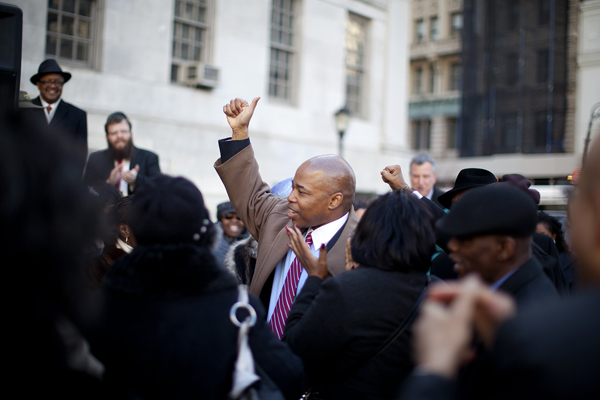
Pearl Gabel
Eric Adams during his first campaign for borough president.2014 – De Blasio Housing Plan Promises Inclusion, Density
When Mayor Bill de Blasio took the helm at City Hall and laid out his housing plan, which centered in large part around the idea of creating a denser city through rezonings and mandatory affordable housing requirements, Adams was on board for the development boom.
The city will soon begin 10 to 15 studies of potential rezonings—most likely new ones, as revisiting the Bloomberg-era ones doesn’t sound like something the de Blasio team is interested in. Only after those studies are done will City Planning actually start moving on rezoning any areas.
Read the full story here
There’s no citywide formula for what the inclusionary housing would look like: It won’t be negotiated on a developer-by-developer basis, administration officials say, but will be tailored to each individual rezoning.
“Build, baby, build. Build tall, build high,” said Brooklyn Borough President Eric Adams, who joined de Blasio and other elected officials for the plan’s unveiling near a housing construction site in Brooklyn. “The jackhammers should be heard throughout this city.”
In his role as borough president, Adams recommended against de Blasio’s 2015 rezoning of East New York, but came out in favor of others, including the proposed expansion of Industry City and the Gowanus rezoning plan (though Adams stressed that the latter must be tied to improvements for local NYCHA campuses).
2014 – Wary Optimism Greets De Blasio’s Brooklyn Redevelopment Plans
Adams has long championed the redevelopment of Broadway Junction, and was one of the stakeholders—along with the city’s Economic Development Corporation and former Councilmember Rafael L. Espinal Jr.—to release a “vision” in 2019 for turning the area into a major business and retail center.
The borough president spoke to City Limits about his hopes for the neighborhood as far back as 2014.
Adams calls the Broadway corridor “an excellent location” for upzoning, thanks to its proximity to transit, with the J and M lines running down its length and Broadway Junction at its eastern end. “We don’t want to see what has taken place downtown, where people are trying to do thousand-foot towers,” he says, but estimates that Broadway could handle construction up to ten stories. Adams says he endorses a 50/30/20 model — where 20 percent of units are designated “low-income” and 30 percent “moderate-income” — so that “we can have the teacher, the accountant, the middle-income Brooklynites able to stay in the community.”
Adams insists that this plan shouldn’t be seen as akin to Bloomberg-era rezonings. “The last 12 years it was about just building, not about protection of tenants,” says Adams. With the new administration, he says, “The beauty of this is everyone is on the same page, talking about keeping these communities affordable.”
Read the full story here
2015 – The Perils and Potential of Closing Rikers Island
Six years ago, as the campaign to close Rikers Island was picking up steam, City Limits contacted all 51 members of the City Council as well as the five borough presidents to get their position on the proposal. Adams—who has since backed, and promised to carry out, de Blasio’s plan to shutter the troubled jail and replace it with four new sites—was against the idea at the time.
Brooklyn Borough President Eric Adams was strongly on the side of reform and against closing Rikers. “I believe closing down Rikers would create more problems for our city than it would solve,” he said in a statement. “Eliminating the complex is not a safe option.”
Read the full story here
2018 – Max & Murphy: Brooklyn BP Adams Undecided on Gov Pick, Hints at Mayoral Pitch
Three years prior to the 2021 mayoral election, Adams stopped by for a sit-down interview with the Max & Murphy podcast to talk all things city policy—and lay the early groundwork for a run at City Hall.
“I’m excited about it. I think that what we were able to do here in Brooklyn and my perception of where I believe the city needs to go, I think it’s going to be different than all the candidates that are running, that are thinking about running,” Adams told hosts Ben Max and Jarrett Murphy, saying he was working on a campaign platform, which would include, he said, reforming the ways city agencies work together to make sure they are cohesive and shooting for the same goals.
“Number one, I want to create a clear mission for the city, that every agency…they should be all moving towards that mission,” he said.
Read the full story here, or listen below
2019 – CityViews: State Must Equip the City to Truly Combat the Homeless Crisis
Adams penned this opinion piece for City Limits describing the ways he thinks the city and state should deal with homelessness, calling for Albany lawmakers to pass long-stalled legislation that would create a new state rental subsidy for New Yorkers facing eviction. He also critiqued de Blasio’s approach to homelessness, calling the mayor’s plan “a good start” but not enough.
“[I]ts commitment to permanent housing solutions falls short for the magnitude of the emergency we face. His proposed set-aside of five percent of a projected 300,000 new and preserved affordable apartments scheduled to be built between now and 2026 does not address the immediate housing needs for tens of thousands of New Yorkers who are ready to leave the shelter system,” Adams wrote.
…
Read the full OpEd here
“We cannot accept chronic homelessness as the new normal in urban America. We must raise the bar on the supply of supportive housing we create.”
2020 – Brooklyn Beep Adams Joins Mayoral Field, Denouncing ‘Dysfunction’
Adams officially joined the mayoral race in November of last year, announcing his candidacy in true pandemic fashion—on Zoom—and pledging to create a more efficient, functional city government.
Adams emphasized safety and strength, referring to the “armor” he had worn in “battles” over the years and his eagerness to keep fighting for a city that was “safer, fairer and better.” As he had previewed in conversations over the past year, Adams rooted his rationale for a mayoral run in a management critique of the current mayor. In his remarks on Wednesday, he fused that argument to a call for racial justice.
“Our city is facing a crisis like we have never seen. We have lost nearly 25,000 New Yorkers to this virus and hundreds of thousands of jobs. I know it all too well. And we are still losing,” he said. “It’s Black and Brown New Yorkers who are losing the most. And that’s nothing new.”
“For far too many it was inequality and injustice, indifferent, dysfunctional government that killed them and we need to be clear on that,” he said. “People talk about the ‘Tale of Two Cities,’ but we need to acknowledge that the dysfunctionality of government is the author of that book.”
Read the full story here
February 2021 – Policy Shop: Ending Cop Immunity, Hitting Hate Crimes and Growing Urban Farms
On the campaign trail, Adams laid out a number of ideas and policies: his support for granting immigrant noncitizens the right to vote, a plan to turn COVID vaccination sites into permanent community health clinics, or a proposal to vastly expand the city’s urban farms.
[His] plan is as much about channeling a forthcoming agrarian New York City to serve public health and economic justice as it is about facilitating that shift to agriculture in the first place.
“Our urban agricultural economy is multiplying and advancing at a thrilling pace. As its new technologies develop fast, it is crucial that this economy maintain a similarly furious commitment to social justice,” the Adams report reads.
Read the full story here
March 2021 – NYC’s Mayoral Candidates Are Asking You To Show Up at the Polls. Did They?
As of March 2021, Adams had cast his ballot 42 times in New York City elections, the third-highest of the Democratic mayoral candidates, a City Limits analysis found (Adams skipped the Barack vs. Hillary presidential primary in 2008, records show. He was also a registered Republican from 1997 to 2001).
April 2021 – In Advocating ‘Precision Policing,’ Adams Embraces a Term Police Critics Have Targeted
Much of the mayoral election was centered around how the candidates would address public safety and their approach to the NYPD. In this piece from April, Jarrett Murphy explores what Adams really means when he champions the concept of “precision policing.”
The well-known civil liberties lawyer Norman Siegel, an Adams ally, believes the candidate understands the need for deeper police reform. “Without a doubt in my mind, when Eric is the mayor, New Yorkers will get a different NYPD. It would be more respectful of constitutional rights, of civil liberties, and at the same time would keep New Yorkers safe.”
Fighting gun violence is important, Siegel says, and precision in policing is possible. Plus, he has told Adams that if his policing policies violate New Yorkers liberties, “’I’m going to end up suing you.’”
Read the full story here
“And we laugh, but he understands that,” the lawyer continues. “And that could be a little deterrent.”
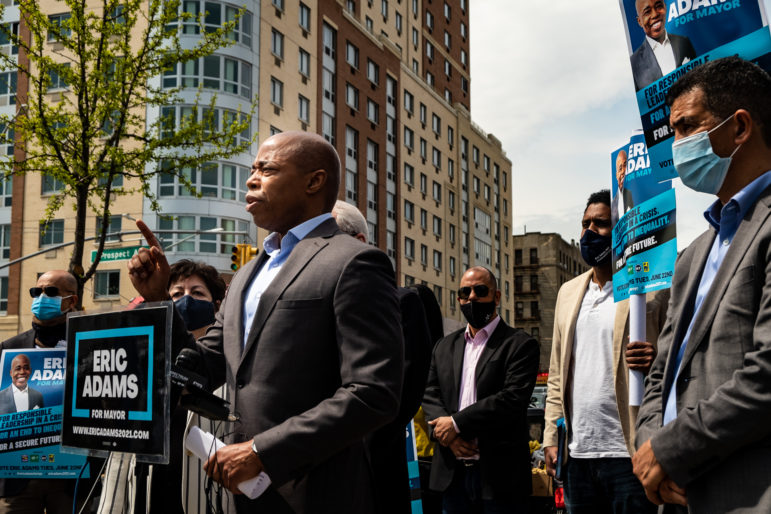
Adi Talwar
Mayoral Candidate Eric Adams in the South Bronx on a mid-April afternoon.May 2021 – The Next Mayor May Be Their Neighbor. These New Yorkers Don’t Care.
Before questions about Adams’ true residency—namely, whether he really lives at his Bed-Stuy brownstone—City Limits reporter David Brand was looking into the borough president’s role as a homeowner, landlord and neighbor.
Alex Cintron has never met the man who owns the brownstone next door to her in Bedford Stuyvesant. She said she’s never even heard of her neighbor, who happens to be the Brooklyn Borough President and, quite possibly, the next mayor.
“I don’t know who Eric Adams is,” Cintron said as she returned home from work May 13. She stopped on the steps outside her Lafayette Avenue apartment to look Adams up online, just to be sure. “No, never seen him before,” she confirmed.
Read the full story here
June 2021 – Eric Adams Offers Tour of Brooklyn Brownstone as Proof He Lives in NYC
Weeks later, in one of the stranger moments of a strange election season, Adams opened his apartment to reporters as proof that the Brooklyn garden apartment is his actual abode.
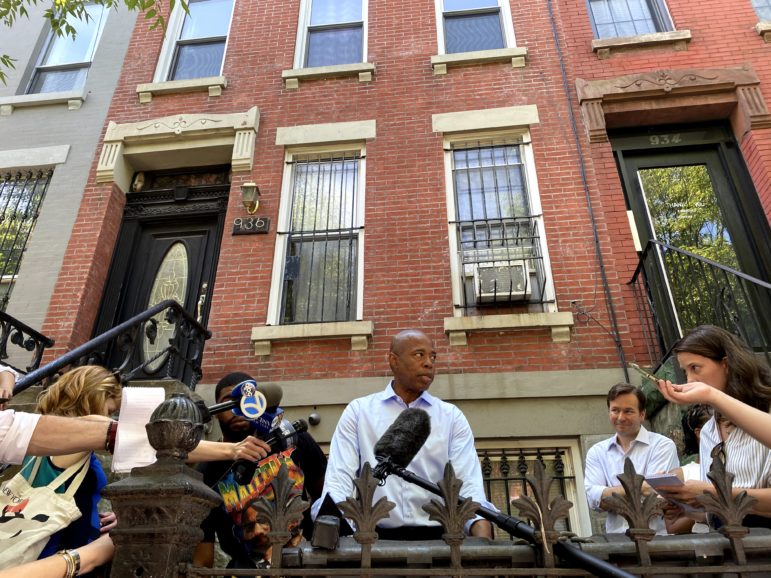
David Brand
Eric Adams addresses reporters outside his Bed Stuy brownstone weeks before the June primary.June 2021 – Eric Adams Strikes Celebratory Tone as Ranked Choice Count Begins
It would still be a few weeks before the final votes were counted and an official winner announced, but Adams was declaring victory on primary night, where he addressed supporters at a victory party held at a posh Williamsburg club.
“New York City said ‘Our first choice is Eric Adams,’” said Adams, the current Brooklyn borough president, in remarks late Tuesday.
…
[T]he preliminary results were enough to edge out Andrew Yang, Adams’ chief rival, who conceded the race earlier in the evening. “As you know, I am a numbers guy,” Yang told a crowd in his home neighborhood of Hell’s Kitchen. “I am someone who traffics in what’s happening by the numbers and I am not going to be the next mayor of New York City based on the numbers that have come in tonight. I am conceding this race.”In his apparent victory speech, Adams took shots at Yang, saying “social media does not pick a candidate. People on Social Security pick a candidate.”
Read the full story here
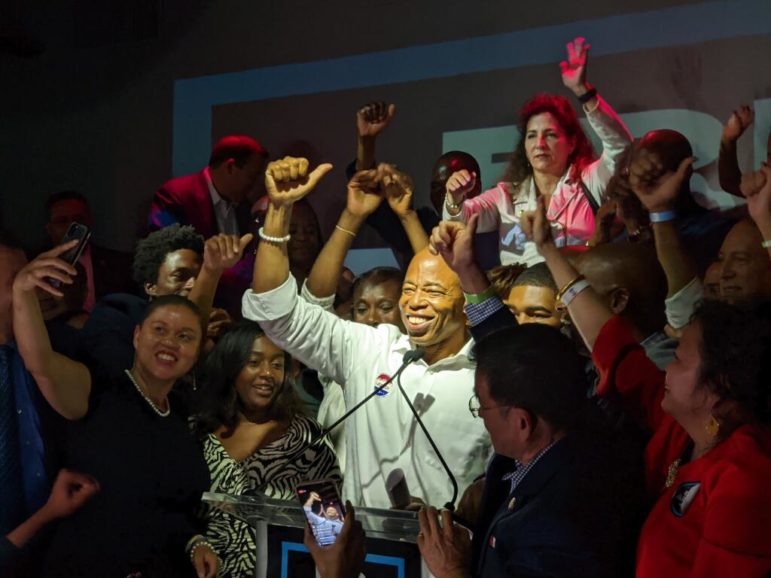
Ese Olumhense
Adams celebrates at an election night party after the 2021 primary.September 2021 – Eric Adams Touts Hotel Conversions in Plan to Address Homelessness
Now on the general election trail, where he was up against Republican Curtis Sliwa, Adams pitched a major component of his housing plan: Converting vacant hotels in the outer boroughs into 25,000 units of supportive and permanently affordable housing.
Whatever the actual target, Adams’ support for hotel conversions has excited housing advocates, social service providers and nonprofit developers, who say a centralized strategy from City Hall will make the projects a reality. The proposal builds on New York’s new Housing Our Neighbors With Dignity Act (HONDA), which unlocks $100 million in state funding to turn commercial buildings and hotels into affordable housing specifically for New Yorkers and individuals experiencing homelessness—a fraction of what it would cost to purchase and convert hotels across the city.
“Let’s go bigger and better. This crisis demands a pretty expansive response,” said Laura Mascuch, the executive director of the Supportive Housing Network of New York.
Read the full story here
September 2021 – Dem Mayoral Nominee Eric Adams Promises To Change NYC’s ‘Anti-Business’ Reputation
Pitching his mayoralty to a group of city business leaders this fall, Adams stressed a break from his predecessor when it comes to his economic plans and how to deal with big business.
“New York will no longer be anti-business,” Adams—who is likely to win the mayoral race because of the city’s overwhelmingly Democratic voter enrollment—said Monday morning, unveiling a multi-pronged plan that includes tax incentives and zoning changes to woo growing industries like cybersecurity and blockchain, and offer free or subsidized childcare for all parents.
Read the full story here
November 2021 – Eric Adams Declares Victory Over Curtis Sliwa to Become NYC’s Second Black Mayor
The long election season came to an end on Tuesday, where Adams saw an easy win over Guardian Angels founder Sliwa, with more than 66 percent of votes. He’s set to become the city’s second Black mayor, following in the footsteps of the late David Dinkins.
“The people of our city, they have spoken,” Adams told the hundreds of attendees present. “And tonight New York has chosen one of us.”
Throughout his campaign, which officially commenced in November 2020, Adams has played up his working-class background and his decades of experience as a public servant—first as a transit cop in the NYPD, then as a police captain and a state senator who served four terms in Albany. A father of one, Adams has been Brooklyn borough president for seven years. “The campaign was never, never, never about me,” Adams said Tuesday.
“This campaign was about the city and the people in it,” he added—“the underserved, the marginalized, the abandoned.”
Read the full story here
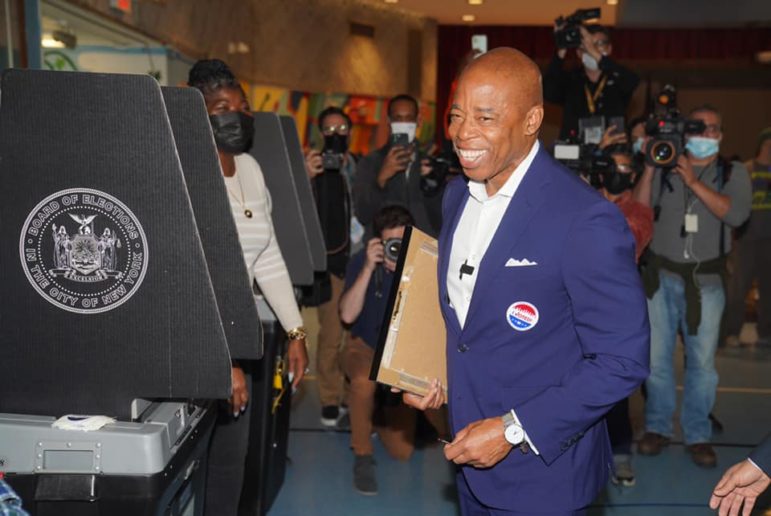
Eric Adams for NYC
Eric Adams after casting his vote on Tuesday.







